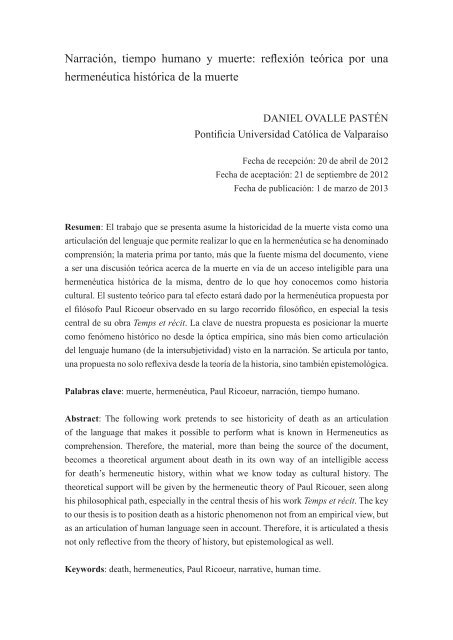Segundo%20nu%CC%81mero%20de%20la%20Revista%20Historia%20Auto%CC%81noma
Segundo%20nu%CC%81mero%20de%20la%20Revista%20Historia%20Auto%CC%81noma
Segundo%20nu%CC%81mero%20de%20la%20Revista%20Historia%20Auto%CC%81noma
Create successful ePaper yourself
Turn your PDF publications into a flip-book with our unique Google optimized e-Paper software.
Narración, tiempo humano y muerte: reflexión teórica por una<br />
hermenéutica histórica de la muerte<br />
DANIEL OVALLE PASTÉN<br />
Pontificia Universidad Católica de Valparaíso<br />
Fecha de recepción: 20 de abril de 2012<br />
Fecha de aceptación: 21 de septiembre de 2012<br />
Fecha de publicación: 1 de marzo de 2013<br />
Resumen: El trabajo que se presenta asume la historicidad de la muerte vista como una<br />
articulación del lenguaje que permite realizar lo que en la hermenéutica se ha denominado<br />
comprensión; la materia prima por tanto, más que la fuente misma del documento, viene<br />
a ser una discusión teórica acerca de la muerte en vía de un acceso inteligible para una<br />
hermenéutica histórica de la misma, dentro de lo que hoy conocemos como historia<br />
cultural. El sustento teórico para tal efecto estará dado por la hermenéutica propuesta por<br />
el filósofo Paul Ricoeur observado en su largo recorrido filosófico, en especial la tesis<br />
central de su obra Temps et récit. La clave de nuestra propuesta es posicionar la muerte<br />
como fenómeno histórico no desde la óptica empírica, sino más bien como articulación<br />
del lenguaje humano (de la intersubjetividad) visto en la narración. Se articula por tanto,<br />
una propuesta no solo reflexiva desde la teoría de la historia, sino también epistemológica.<br />
Palabras clave: muerte, hermenéutica, Paul Ricoeur, narración, tiempo humano.<br />
Abstract: The following work pretends to see historicity of death as an articulation<br />
of the language that makes it possible to perform what is known in Hermeneutics as<br />
comprehension. Therefore, the material, more than being the source of the document,<br />
becomes a theoretical argument about death in its own way of an intelligible access<br />
for death’s hermeneutic history, within what we know today as cultural history. The<br />
theoretical support will be given by the hermeneutic theory of Paul Ricouer, seen along<br />
his philosophical path, especially in the central thesis of his work Temps et récit. The key<br />
to our thesis is to position death as a historic phenomenon not from an empirical view, but<br />
as an articulation of human language seen in account. Therefore, it is articulated a thesis<br />
not only reflective from the theory of history, but epistemological as well.<br />
Keywords: death, hermeneutics, Paul Ricoeur, narrative, human time.


